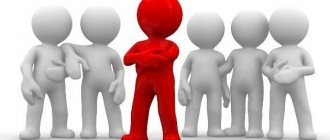What is morality?
Morality is, in simple words, a complex of positive characteristics of an individual. This is his assessment and attitude towards life, towards others, and even the way of life itself. The concept of “morality” has a broad meaning. It includes several categories, which we will discuss below.
A moral person is one who lives according to conscience, realizes the value of each person, and is guided by moral laws. He is faithful to the traditions of his people, family, country.
Morality in psychology is, first of all, a person’s assessment of himself, his own actions, thoughts, and lifestyle. An individual lives by his own rules. They are the main criterion when choosing or making a decision. If a person is comfortable, she does not experience pangs of conscience, does not overstep herself, then she behaves in accordance with the chosen position.
Morality can be lost in the course of life. Then they say about a person that he acts immorally, contrary to human laws. At the same time, it is necessary to understand that laws at the state level may not be accepted by the individual and may not even be implemented. At the same time, he will remain a deeply moral person, living according to conscience and justice.
True believers who adhere to the canons of the Bible are considered deeply moral people. They keep the commandments. This is a criterion for them, the main guideline in life.
Scientists believe that the first signs of morality arose in primitive society. Then man realized that he could not be guided only by animal instincts. He must also take care of the people around him, help them, support them, control his emotions and impulses.
Morality requires will and character from the individual. If a child takes candy from someone who is weaker, we can already talk about a low degree of morality.
Parents are always responsible for the actions of their children. If a child behaves immorally in relation to the elderly, animals, cultural or other generally recognized values, those who set the example are responsible, first of all, the family.
Text of the book “Ethics: A Cheat Sheet”
9. ETHICAL MEANING OF HAPPINESS
Happiness
- a state of lasting satisfaction from the experienced pleasure and fullness of life. It accompanies every moment of human life as a manifestation of the highest value. Therefore, it is closely connected with the fate of a person. It was in the sense of the goal of all human aspirations that happiness was understood in the era of antiquity.
Eudaimonism
– an ethical direction that considers happiness as the motive and goal of all human aspirations. Adherents of eudaimonism considered happy the person whose physical and spiritual abilities could develop unhindered. Representatives of eudaimonism at different times were Socrates, Epicurus, B. Spinoza, G.V. Leibniz, L. Feuerbach, G. Spencer and others. The foundations of the doctrine of happiness were laid and developed by the ancient schools of the Hellenistic era: the Stoics, Epicureans and skeptics.
Happiness
- dispassion and ascetic lifestyle, accompanied by renunciation of earthly feelings.
This is the essence of the Stoics' understanding of the nature of happiness.
The main principle of a happy life, in their opinion, should be apathy. Apathy is independence from feelings and passions. Therefore, a happy lifestyle is the destiny of a sage. He is always devoted to reason, and his statements are correct and impartial.
Happiness
– freedom from passions and fearlessness before death and mortal pain.
This was the ideal of a happy life for the skeptics.
It was based on the principle of ataraxy.
Ataraxia is a moral principle according to which happiness lies in peace of mind and serenity. The path to happiness lies through following another principle - the principle of epoch. Epoche
- abstinence from judgment, followed by calmness.
Happiness
- the desire for pleasure and pleasure.
This is the understanding of happiness by the Epicureans,
who distinguished two types of happiness:
1) the highest happiness belonging to the gods, it cannot be increased;
2) happiness that is achievable for a person and allows for multiplication.
The Epicureans did not see in every pleasure the guarantee of a person’s future happiness, but only in those that correspond to his rational nature. Happiness is impossible for a person who lives unreasonably, since reason is the highest good for a person. The moral meaning of happiness consists in a person’s desire for joy, pleasures and pleasures, but only those that do not harm his spiritual and physical health. Happiness is driven by human desires, but not all of them are morally justified and are often achieved to the detriment of the person himself and the people around him. Otherwise, the pursuit of happiness turns into unhappiness. Misfortune
– a character trait of a person that leads to mistakes, misdeeds, adversity, illness or loss of loved ones. The pursuit of pleasure does not guarantee happiness and, on the contrary, self-denial is a closer path to it. Ultimately, happiness results from living a virtuous and morally consistent life.
10. JUSTICE AS A REGULATORY PRINCIPLE OF PUBLIC AND INDIVIDUAL RELATIONS
Justice
- a principle that regulates the relationship between people as members of society regarding the distribution of social values, which are freedom, favorable opportunities, income, signs of prestige and respect.
Aristotle,
and along with it, all ethical thought distinguishes between two types of justice:
1) distributive justice
– distribution of honors, property and other material benefits among members of society according to merit and in proportion to merit;
2) fairness associated with exchange
– equalization of the parties involved in the exchange, regardless of their merits.
In both cases, there is implied agreement between members of society regarding the principles of their lives. These principles may change, but the understanding of justice depends on what rules have been established in a given society. Their violation is perceived as injustice.
Justice
- a principle of individual behavior that sets a limit to arbitrariness. It requires respect for the rights of another person, non-violation of the person and her property. The main requirement of justice is respect for the rights and dignity of people. It guides a person to fulfill his obligations to other people. Obligations can be presented in the form of legal laws, constitutional rights, moral ideas.
The distinction between justice and injustice is established individually for each individual. This issue is discussed in detail in Plato's dialogue Gorgias. Justice
is considered as the equality of people before each other, expressed in the commission of actions that do not violate the rights and freedoms of other people.
To be fair or to be punished for injustice is regarded as happiness for a person, because the one who acts unjustly and remains unpunished serves evil and does not even have an idea of \u200b\u200bwhat the true good is. By incurring punishment, a person gets rid of the corruption that darkens the soul. In this sense, it is better to endure injustice than to inflict it on other people. Injustice
is the greatest evil for the one who commits it, because it not only makes him morally worse, but also deprives him of the opportunity to correct his own moral mistakes. For the same reason, injustice cannot be justified either by law or custom.
11. BEHAVIORAL ANALOGUES OF MORALITY IN LIVING NATURE
The theory of the English naturalist Charles Darwin (1809–1882) about the evolutionary origin of species through natural selection led to the development of a new approach to the problem of the origin of morality and ethics. Darwin explains the origin of moral feeling from feelings of sociability, which exist instinctively or are innate in lower animals. Sociability instinct
- a feeling that gives pleasure from being in the company of individuals similar to oneself and the empathy or sympathy felt towards them.
Sympathy
is a feeling of camaraderie and mutual experience of the same impressions. To varying degrees, developed intelligence prompts animals and also humans to feel shame and dissatisfaction due to the fact that their social instinct has given way to other instincts. The reason for the strengthening of the social instinct and mutual sympathy is habit. From observations carried out on the lives of animals, it became obvious that they are capable of sympathy not only in pleasures, but also in misfortunes. From here the idea of the existence of mutual assistance among animals as the basis of morality is formed. Despite man's need to develop his own individuality and the insignificant influence of social instincts on his life, he is a sociable creature. The ability to sympathize with one's relatives is preserved in the human subconscious and is supported by reason, experience and the desire for approval from other people.
Darwin came to the conclusion about social instinct as the source of development of all moral principles. Its development was greatly facilitated by natural selection due to its usefulness for the preservation and development of the species. Natural selection comes into conflict with the instinct of self-preservation and the instinct of affection of parents for their offspring and gains the upper hand. However, this does not prevent the interconnection and mutual development of these instincts. In human society, the power of the social instinct is most evident due to the ability of people to experience feelings of guilt. Thus, a person who yielded to the natural instinct of self-preservation and did not sacrifice his life to save another person experiences pangs of conscience.
Moral conscience
- a feeling testifying to our past misdeeds, the memory of which makes us feel a feeling of displeasure. Conscience is the result of a struggle in which the no less strong and no less constant personal instinct gives way to the more constant social instinct. Darwin, who knew nature, substantiated the argument that the social instinct is stronger than the personal instinct of self-preservation. This is explained by the fact that it is maintained by natural selection, and those species in which it weakened were mercilessly exterminated. Mutual assistance within the species became the main reason for its progressive development.
12. MAIN DIRECTIONS OF THE TEACHING ABOUT THE ORIGIN AND NATURE OF MORALITY
In the history of ethics, three main approaches to the origin and nature of morality can be distinguished.
1. Religious ethics
affirms the Divinity as the source of the emergence of moral values - norms, principles, ideals, basic ethical categories and a person’s ability to follow them. God turns out to be a necessary authority that gives morality its universal, absolute and unchanging character and spiritual meaning. The divine origin of morality is explained by the fact that people, due to their bodily and sensory nature, cannot independently curb desires and passions and turn to God for help. Faith in God helps to follow moral principles and develop ideas about true humanity. At the same time, man is the highest creation of God, and in him there is a Divine principle, or the tendency to follow moral standards.
2. Naturalistic ethics
deduces moral requirements and norms from nature as a whole and human nature in particular. However, it is impossible to find the criteria of morality in nature without the help of reason, since humans are characterized by both vices and virtues. Reason allows us to determine the measure and value of what leads a person to good and what to evil. In modern times, discussions about the moral nature of man diverge. Thus, T Hobbes saw in the natural nature of man only evil, which should be curbed by a social contract and laws. J. - J. Rousseau and G. Grotius, on the contrary, saw precisely in the natural nature of man the guarantee of morality and social order. Ethics received a strong natural scientific foundation after Charles Darwin created the theory of the evolutionary development of man and nature in their organic relationship. In nature, through natural selection on the principle of biological expediency, the diversity of nature is generated, including man with his moral abilities. In the processes of adaptation to changed conditions and natural selection, individuals with biologically and morally useful properties survive. They pass on their skills to subsequent generations. Morality acquired biological value and expediency.
3. Socio-historical ethics
in the question of the emergence and formation of morality, it proceeds from the decisive role of labor and social production. Labor activity led to the emergence of human speech and consciousness, which contributed to the humanization of primitive society. The unification of people into a single community occurs on the basis of the division of labor and the exchange of its results. In the process of labor, a person transforms his own nature and creates conditions for creative activity and development. Socio-historical ethics views morality as a product of social development, the basis of which is social needs and interests.
13. MORAL IDEAL AND HIERARCHY OF VALUES
Moral consciousness
– a set of moral concepts and values characteristic of a certain historical era.
It is characterized by the ability to make everything the object of moral judgment and evaluation, expresses the general historical need for recognition of the individual in its specific historical manifestation and is based on the moral ideal of the individual. A moral ideal
is the embodiment of the idea of a morally impeccable person who combines moral virtues and acts as a role model.
In the moral consciousness of an individual, the moral ideal appears as a critical negation of imperfect reality and its spiritual overcoming. It creates conditions for the spiritual development of the individual based on the unification of moral norms as high goals. Thanks to this, a correct assessment of moral values and the validity of an individual’s appeal to them in their activities are possible. The moral ideal
is the result of a general moral idealization, which expresses critical dissatisfaction with reality and the unwillingness of morality to come to terms with its imperfections.
Moral idealization finds expression in the desire of moral consciousness for a better, ideal type of relationship between people. Therefore, the moral ideal sets a value orientation for people’s actions, expressing the initial position of a person, which he adheres to throughout his life. The value orientation of an individual is determined by the value system. Value
is everything that is recognized by the most significant individual or society.
The system of moral values
includes the following concepts:
1) good
- everything positively assessed by moral consciousness in relation to the principles of humanity;
2) moral duty
- a person’s acceptance of moral requirements and values as a personal task.
Moral duty orients a person towards the interests of the group, but they do not always coincide with his personal interests and do not always correspond to moral standards; 3) conscience
- a person’s ability to bear moral obligations, control and evaluate his behavior.
Guided by his own conscience, a person takes responsibility for his own ideas about good and evil, justice and duty; 4) dignity
- the expression of ideas about the value of a person as a moral person.
It expresses the requirement of a respectful and friendly attitude towards a person, recognition of his freedom in self-determination and equality in rights; 5) honor
- recognition and respect of a person in connection with his merits.
Honor is based on a person's integrity and respect for the rights of others; 6) justice
- an expression of the principle of obligation in human relationships, which corresponds to the purpose of a person.
A person who adheres to moral standards is able to achieve happiness; 7) happiness
- awareness of a person’s lifestyle that brings him satisfaction;
 the meaning of life
the meaning of life
is the recognition of the significance of human life and the determination of its goals.
14. NATURE, FEATURES AND CRITERIA OF MORAL EVALUATION
Moral assessment
- approval or condemnation by moral consciousness of phenomena of social and individual life.
Moral assessment allows us to establish the compliance of social relations and human life with moral requirements. When making a moral assessment, a person sometimes acts unconsciously, guided by emotions, feelings, intuition, subjective life experience or passions. However, in these actions he is based on general moral values that he had previously mastered. Moral assessment
is a person’s conscious value attitude towards reality and the establishment of its moral meaning.
When analyzing a moral assessment, the following elements are distinguished:
1) subject of moral assessment
- an individual or group of people who have a stable public opinion, a collective judgment on socially significant issues. The subject expresses judgments and actively influences individual and social life;
2) object of moral evaluation
- all phenomena of human life that are subject to moral comprehension. Morality sets the humanistic character of the objects being assessed. Therefore, the object of moral assessment is the moral activity and actions of a person, as well as the spheres of economics, politics, law and spiritual culture of society.
Moral assessment has an indirect impact on the system of social relations, shapes people’s attitudes towards social events and changes their activities. Moral assessment also concerns moral requirements and values due to the self-awareness of the individual and his independent decision-making.
The nature and form of moral assessment
- the reaction of approval or condemnation of an individual to ongoing phenomena of social life.
It is expressed in the form of encouraging or disapproving actions, sympathy and support, displeasure or criticism. Moral evaluation is expressed in value judgments such as honest, decent, courageous, modest, hypocritical, indifferent, generous or hospitable. The basis of moral assessment
is the values and forms of expression of moral requirements that are established in relation to the motives and attitudes of behavior, character traits, actions of a person, his life position and social life in general.
These include norms and principles of morality, moral ideals, concepts of goodness, justice, honor, dignity and duty. Criteria for moral evaluation
are concepts that characterize the moral value of individual and social life. A person shows his moral characteristics in relation to other people with whom he enters into relationships in society. Therefore, the highest and absolute criterion of moral assessment is the socio-historical necessity of developing the values of human life, recognizing and ensuring individual rights and freedoms.
15. MORAL ACTIVITY, MORAL ACTION AND RELATIONSHIPS
Moral activity
– an indicator of the social significance of human activity.
It is manifested in the provision of humanitarian assistance, moral preaching, moral education of the individual and love for people. It is subject to moral requirements and is therefore subject to moral evaluation. Moral activity consists of actions that have their own structure. A moral act
is socially significant human behavior performed consciously and in accordance with personal motivations.
For the moral assessment of an act, i.e., establishing its moral quality, the value-substantive characteristics of the action are important. The assessment covers the act in its entirety and takes into account the conditions of its commission. Therefore, it is important to know how the moral assessment of an action develops. The moral value of an action increases as the obstacle to its completion and success in overcoming it increases. An act deserves high praise if it required the maximum application of will, skill and perseverance from a person to perform it. An action consists of its motivation, intention and purpose of action, the means to achieve it and the result obtained. Intentions and goals
express a person’s ideas about the subject of his action and form the method of its commission and the result.
The basis of a moral act is motive. Moral motive
is the personal motivation of an individual to commit an act. It is formed under the influence of society, but is recognized by the individual as part of his own consciousness, which is expressed in the desire to make his own contribution to ensuring a successful resolution of the conflict and in the desire to help the parties involved in it. The moral motive consists of a person’s ideal desire and desire for a moral act.
Content of a moral act
– actions of the individual, means, conditions, circumstances of achieving moral goals and their results.
The result of a moral act
is an indicator of the moral value of the act for society and its benefits for the spiritual development of the individual.
Moral relations
– a set of social relations motivated by moral values and goals. Unlike other social relations, moral relations are expressed in the form of values and form the basis of social relations that are included in all public spheres - economics, politics and culture. They carry morally valuable content and determine people’s behavior. In moral relations, a person takes an active position, since they arise as a result of his activities, and a passive one, since he is obliged to master the system of moral norms and values accepted in society. Moral relations form a person’s understanding of the public good – the conditions for human solidarity.
16. SOCIAL SIGNIFICANCE OF MORAL FUNCTIONS
Morality
- an internal regulator of human behavior, setting him up to comply with the principles of humanity.
Therefore, the purpose of morality is the spiritual mastery of reality. It is necessary as a reliable means of orienting a person in the sphere of social relations and values, helps regulate human behavior and the entire system of social relations in order to maintain cooperation and cohesion of society. The purpose of morality
finds concrete expression in its functions:
1) regulatory function
– the ability of morality to harmonize social relations and form a morally mature personality in accordance with moral values and requirements. Values and moral requirements act as a way for society to understand its needs and the need to improve. Society represents its interests from a position of duty, since individual interests are closer to a person, and public interests are perceived as a perspective. The success of morality in fulfilling its regulatory function depends on a person’s ability to accept social requirements as his personal motives for behavior. This task is simplified if a relative balance of interests is established in society and human needs are recognized and guaranteed by society. In this, an important role is played by the high spiritual level of human development, which helps him to correctly perceive moral duty;
2) evaluative-imperative function
morality is expressed in reflecting reality from the point of view of duty. Morality establishes and evaluates the compliance of a person’s actions with the principles of moral values and determines the moral qualities of an action;
3) educational-humanistic function
morality - the introduction of a person to a system of moral values, spiritual ideals and the development in him of moral feelings, which are expressed in the ability to empathize, sympathize and be merciful. These feelings determine the essential trait of a person - humanity;
4) cognitive function
morality – the ability of morality to reflect reality from the point of view of moral obligation and principles of humanity. Morality as a cognitive sphere orients a person towards the future and makes demands on him of duty, which, it seems, cannot be fulfilled in an actual social situation;
5) ideological function
morality - the ability of morality to strengthen the political positions of one side and weaken the positions of the other. This is done by presenting the expediency of actions, humanity and justice of one of the parties and criticizing the self-interested and calculating actions of the other party.
All functions of morality are interconnected and intersect. Regulation by society is possible subject to the development of moral requirements and values, an evaluative attitude and the cultivation in a person of the need for spiritual improvement.
What concepts belong to the categories of morality?
Ethics, morality and ethics are interconnected concepts. If a person is not guided by the rules accepted in society, one cannot talk about morality. Ethics are politeness, tact, intelligence, and respect for other people. A moral person must be familiar with at least the basic principles of ethics.
In addition, behavior should be the norm, a habit. Of course, at first a person can force himself to act as the rules dictate. But later they will take hold. Therefore, children are taught from an early age to say hello, say words of gratitude, respect elders, and value work.
Aristotle said that ethics is the ability to restrain the impulses of the soul. A person cannot be guided by impulses, express anger, aggression, hatred, if he is a moral person.
In general, the word “ethics” is of Greek origin. This is a synonym for morality in the Slavic understanding. The concept of “morality” appeared later. This is how Cicero translated the word “ethics”. He also denoted to them the properties and character of a person. Many articles are devoted to this issue.
We recommend: what is the difference between morality and ethics?
Psychologists say that all three words are synonymous and do not exclude each other. If we talk about a highly moral person, we mean a moral, educated person who lives according to the rules of ethics.
In general, we can talk about morality only taking into account all the social norms that a person must adhere to. These are his moral duties. There will be no punishment for non-compliance. No one will receive a real sentence, for example, for not respecting elders or not maintaining relationships with relatives. But such a person will face pangs of conscience and condemnation from society. These are sanctions for violating generally accepted rules.
How is morality different from ethics?
Many people argue that morality and morality are synonymous, but this is a fallacy. Morality is considered to be a system established by society that regulates the relationships between people. Morality means following your own principles, which may differ from the attitudes of society. In other words, moral qualities are given to a person by society, and moral qualities are established by character and personal psychology.
| Morality | Moral |
| A specific sphere of culture in which high ideals and strict norms that regulate human behavior and consciousness in various areas of public life are concentrated and generalized | Principles of real practical behavior of people, in which the severity of highly moral norms is significantly softened, that is, this concept is given a more “everyday”, “down-to-earth” meaning |
| What should be, what should a person strive for (the world of what should be) | Actually practiced norms that a person encounters in everyday social life (the world of existence) |
Rules of morality
The basics of morality are actually very simple. Politeness and respect for each other come first. Add here a sense of tact and delicacy and you get the characteristics of a moral person.
The golden rule of morality is: treat others as you would like to be treated.
There is a parable about a wise man. It is in it that the rules of morality are revealed. Let us recall the content of the legend.
One of his students approached the sage. He said: “Oh, wisest one! You know so much about goodness and justice, you encourage people to be honest and kind to each other. You claim that this is the only way to achieve purity of soul. Can't you combine all the requirements? How should people treat each other? And the sage answered: “In return.”
That is, we should all treat others the way we would like them to treat us. If you do not visit your elderly parents, refuse to help them, and place the father and mother in a nursing home, then do not expect any different behavior from your children.
The basic rules of morality are expressed in parables. They were described by L. Tolstoy in stories for children. These works are studied by children in primary schools, and excerpts are read in kindergartens for educational purposes.
If you are thinking about your own morality, I recommend re-reading the parables and using folk wisdom. Then you will be able to define values for yourself and respect the same values among people around you.
Functions of morality
| Function | Content |
| Worldview | – morality forms value orientations: norms, assessments, prohibitions that are carried out by individuals in society. |
| Cognitive | – gives the individual information about the cultural environment of a particular society. |
| Regulatory | – morality regulates people’s daily lives: in communication, everyday life, at work. Imposes sanctions and maintains rules of conduct. Public opinion is the force. |
| Estimated | – phenomena and processes in the world are considered through a humanistic approach. Allows you to distinguish between good and evil and derivative concepts (justice, honesty). Moral assessment is expressed in praise, blame, agreement, etc. |
| Educational | – ensures the transmission of values and norms from generation to generation. |
| Motivational | – human behavior is motivated by moral principles, encouraging one to do or not do something. |
| Controlling | - control of the individual himself, based on the condemnation of others or conscience. |
| Coordination | – interaction of people in different circumstances. |
| Integrating | – the unity of society and the integrity of the inner world of man. |
Examples of Morality
Let's look at examples of morality from life. It is worth saying that every person in one situation or another is faced with a moral choice.
He is guided by his own position. For example, a child enters school and encounters a teacher. He decides for himself what to do: walk past and pretend he didn’t notice the teacher, or say hello. This is the simplest example of the manifestation of morality.
Such situations happen in everyday life every minute. We decide whether to let an old woman pass in line, whether to help a woman with a stroller, or whether to pass by the vandals who are destroying the Eternal Flame.
Men faced with a choice when faced with a girl's pregnancy. A woman who has given birth, for example, to a sick child, also faces a moral choice. She can devote her life to caring for a disabled person or leave him in the baby's home. Her choice will affect the fate of this child. Every person is free to do as his heart advises him. There should be no punishment for this.
I would like to give one more example from the lives of adults. Spouses make a promise to be with each other in moments of joy and sorrow. Unfortunately, not everyone is able to fulfill the vow. Men leave their wives with small children, women go to wealthier and more successful men. There are many options here. But everyone must remember that the final decision is made by the individual. And his choice cannot be influenced by the opinions of others or circumstances.
I hope that now you can give your own example of a moral act from life.
Morality and healthy lifestyle
How does morality affect human health? We know that a person under the influence of chemicals cannot be considered adequate.
A person under the influence of alcohol or drugs is unable to behave morally. He destroys himself, eradicates the principles of morality. From this we can conclude that morality and health are interconnected.
But a person’s morality is not determined by physical health. Even people with disabilities are capable of remaining deeply moral people. If a seriously ill person torments his loved ones with his antics, there is no need to talk about his morality. But we cannot condemn him due to his illness.
We need to understand that by giving up bad habits, we increase our own level of morality. Nobody knows what consequences the next portion of alcohol will have. Think about those around you, don’t be a bad example, and therefore maintain morality.
A moral person will not smoke a cigarette in front of school or in a public place. He always thinks about those for whom he will serve as an example or cause ill health. Thus, a healthy lifestyle already reveals signs of morality.
Morality and travel
How does travel contribute to the development of morality? We have already said that a moral person is a well-mannered person. By traveling, we broaden our horizons, get acquainted with the traditions of different countries, learn to respect the customs, religion, and culture of foreigners.
When traveling, do not forget that we are guests in a foreign country. Never laugh at traditions; you cannot mock what is valuable for a particular nationality.
A moral person will not allow himself to enter a mosque, say, with his head uncovered, or to damage cultural monuments and historical values. He will keep the hotel room and rest areas clean.
Thus, he shows not only his morality. He also shows respect for his own Motherland and does not discredit the reputation of the nation.
Morality in business
Nowadays it has become fashionable to discuss whether business and morality are compatible. It is interesting that society is divided into two camps. Some people are sure that immoral behavior is common to all businessmen. They do not keep promises, inflate prices, deceive competitors and partners, and profit from people.
But there are also those who observe moral standards. For such businessmen, the terms of the contract are important; they conduct business honestly and do not infringe on the rights of others.
Sometimes they operate at a loss. But, nevertheless, these are moral people who were able to maintain a human appearance in conditions of fierce competition. They did not become slaves to money.
Politics and morality
The moral criteria of politicians are expressed in the measures taken for the sake of the country's population. If the authorities take care of the elderly, pay decent pensions, and are concerned that all people can receive free medical care, for example, then we can talk about the morality of the authorities.
The moral views of politicians are always visible to the common people, those who elected power. In general, a person vested with power must act in the interests of the population of the country.
Moral principles will not allow such a politician to pass laws that infringe on the rights of the population. He will do everything in his power to help all social classes. The general situation in our country makes many citizens think about the morality of politicians.
Morality and spirituality
High morality is noted among believers. Spiritually developed people always remain deeply moral. They are guided by unwritten rules. They live to make the world a better place. Here we will not talk about those who only pretend to be believers, spiritual. Such a person hides behind commandments for his own profit.
Let's give a simple example that every citizen can understand. We know that many clergy drive luxury cars, live in the richest mansions, while their parishioners donate their last money to the temples. It is difficult to call such priests moral people.
At the same time, among the clergy there are those who are ready to share the last piece of bread with the beggar. Spirituality and morality are compatible concepts. An immoral person cannot be spiritual.









